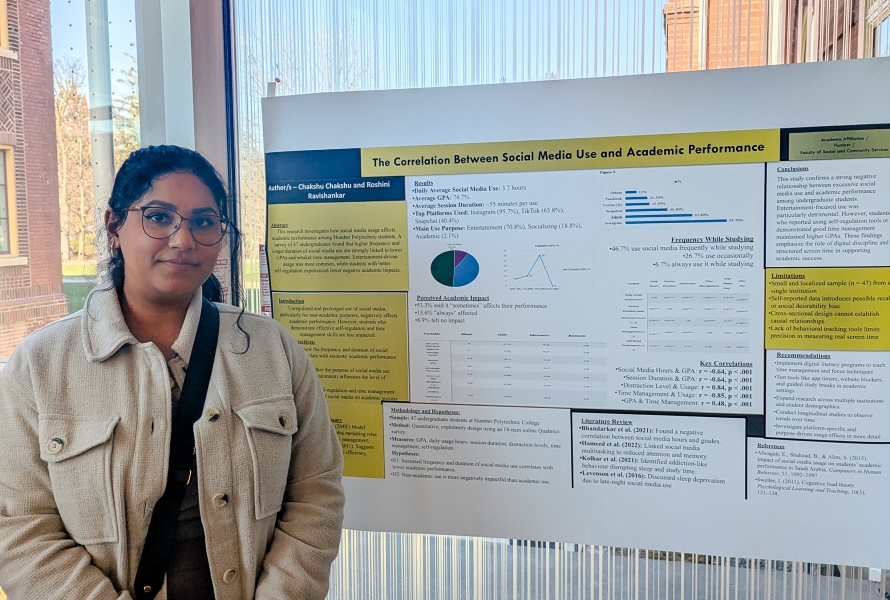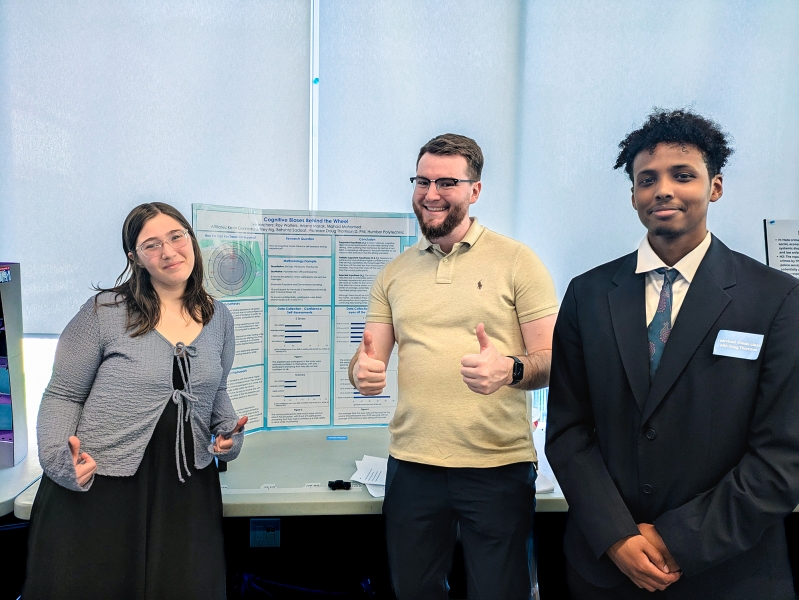Thesis is a Marathon

By Mar Greig
Thesis is often described as a marathon and for fourth-year Bachelor of Social Sciences – Criminal Justice students, that metaphor couldn’t be more fitting. From narrowing down complex legal questions to navigating team dynamics and research ethics, students at Humber have spent the past year investigating into some of society’s most pressing challenges.
At a recent poster showcase held at the Lakeshore Campus, they presented their work with a mix of pride, exhaustion, and clarity about what it means to be a researcher in the field of justice.
“It’s like guiding them and coaching them through a marathon,” said Aqeel Saeid, program coordinator of the Bachelor of Social Sciences - Criminal Justice program. “It’s a very rewarding experience.”
According to Saeid, students face numerous challenges in the yearlong thesis process, including narrowing down large research questions, getting enough participants and managing group dynamics.
“When it comes to writing a thesis, it’s not really a straight line,” said Saeid.
Guided by curiosity and personal experience, three groups shared their unique insights into their research as well as the thesis process overall.
The Internal/External Factors that Contribute to Recidivism in Male Halfway Houses
Alyssa Michelle Ferreira and Chelsea Paglialunga’s research explored recidivism rates in halfway houses.
“I want to preface by saying that I work at a halfway house, which inspired me. We worked very hard in trying to figure out what exactly causes recidivism in male halfway houses in Canada,” said Ferreira.
Their hypothesis proposed that halfway houses in lower-crime neighbourhoods would be more successful in reducing recidivism compared to those in higher-crime areas. Their findings supported this, highlighting key factors such as location, age, and length of stay as major contributors.
The team said the most significant challenge they encountered was a lack of existing research and data on the topic.
“It’s not until the actual end, where you have all the pieces of the puzzle, and you’re finally putting them together [that you think], ‘wow, all of this research wasn’t exactly for nothing,’” said Paglialunga.
Thesis advice? Don’t procrastinate!
“Start working on it as soon as possible, and don’t procrastinate. If you procrastinate and leave things for the last minute, sometimes it works out, but sometimes it doesn’t,” said Ferreira.
The Correlation Between Social Media Use and Academic Performance
While some students examined systemic issues in the justice system, others focused on how digital behaviour intersects with academic outcomes. Using survey data from 47 undergraduate students, Chakshu Chakshu and Roshini Ravishankar investigated how social media habits influence academic performance.
“As a student, I’ve been using social media a lot lately, just to burn some time or [for] stress relief. I know it impacted me when I was studying,” she said.

Curious if other students were also impacted the same way, her team hypothesized that frequent social media use would negatively affect grades. On average, respondents reported 3.7 hours of daily use with session durations averaging 55 minutes. Instagram was the most used platform (95.7%), followed by TikTok (63.8%) and Snapchat (40.4%).
Their research found that entertainment use was the most frequent type of use—and most detrimental to GPA. However, students who used self-regulation tools and practiced time management tended to perform better academically.
Thesis advice: Pay attention in stats class.
“I would recommend that they pay as much attention [in stats] as they can because if they want to use the quantitative method for the thesis, that’s a must,” Chakshu said.
Cognitive Biases Behind the Wheel
Not all projects focused on policy or personal habits — some explored how psychology plays out behind the wheel in real time.
Ariane Marak, Mahad Mohamed and Roy Walters examined distracted driving through the lens of cognitive biases—specifically the Dunning-Kruger effect and cognitive dissonance—using Humber’s Driving Simulator Lab to collect data.
“We think texting while driving is something that really needs to be discussed, especially [since] a lot of college students, or youth in general, are driving, and you want them to practice safe driving,” said Ariane Marak.

Using the SIM lab, study participants did a five-minute driving simulation. The team sent participants text messages via WhatsApp and monitored how long (and how often) participants took their eyes off the road.
“[When] you just glance at your phone, just for a few seconds, you are going the length of a football field with your eyes closed. Anything can happen in five seconds,” said Marak.
She cites a National Highway Traffic Safety Administration claim that sending or reading a text takes drivers’ eyes off the road for 5 seconds. At 90 km/h, it’s the equivalent of driving the length of an entire football field.
Their research found that experienced drivers took their eyes off the road for 35 seconds, while novice drivers took their eyes off the road for 39 seconds.
“Teen drivers acknowledge the dangers of texting and driving but still engage in it. They’re aware but justify it: ‘Oh, I’m texting at red lights. I’m texting at stop signs,” said Mahad Mohamed.
Mohamed is describing examples of cognitive dissonance, a cognitive bias wherein people know what they’re doing is wrong but attempt to justify their actions.
Thesis Advice? Pick teammates (and faculty advisors) that you trust
“Find people that you work well with. That is very pertinent. I work very well with my partners. I’m very grateful to have been working with them. And go to a professor that you want to go to,” said Marek.
Reflections from the Process
Across all three projects, students emphasized the importance of teamwork, time management, and mentorship. Whether they were navigating limited datasets, conducting simulations, or coordinating interviews, each team faced moments of doubt and discovery. Their advice to future students was consistent: start early, stay curious, and choose collaborators wisely. As faculty member Aqeel Saeid noted, the thesis process isn’t linear — but it’s where many students find their professional voice for the first time.
The thesis showcase is more than an academic checkpoint — it’s a reflection of Humber Polytechnic’s commitment to experiential, student-centred education. As these students transition into careers in justice, law enforcement, research, and advocacy, they carry with them not just their findings but the applied skills and collaborative mindset that will shape their future impact.

